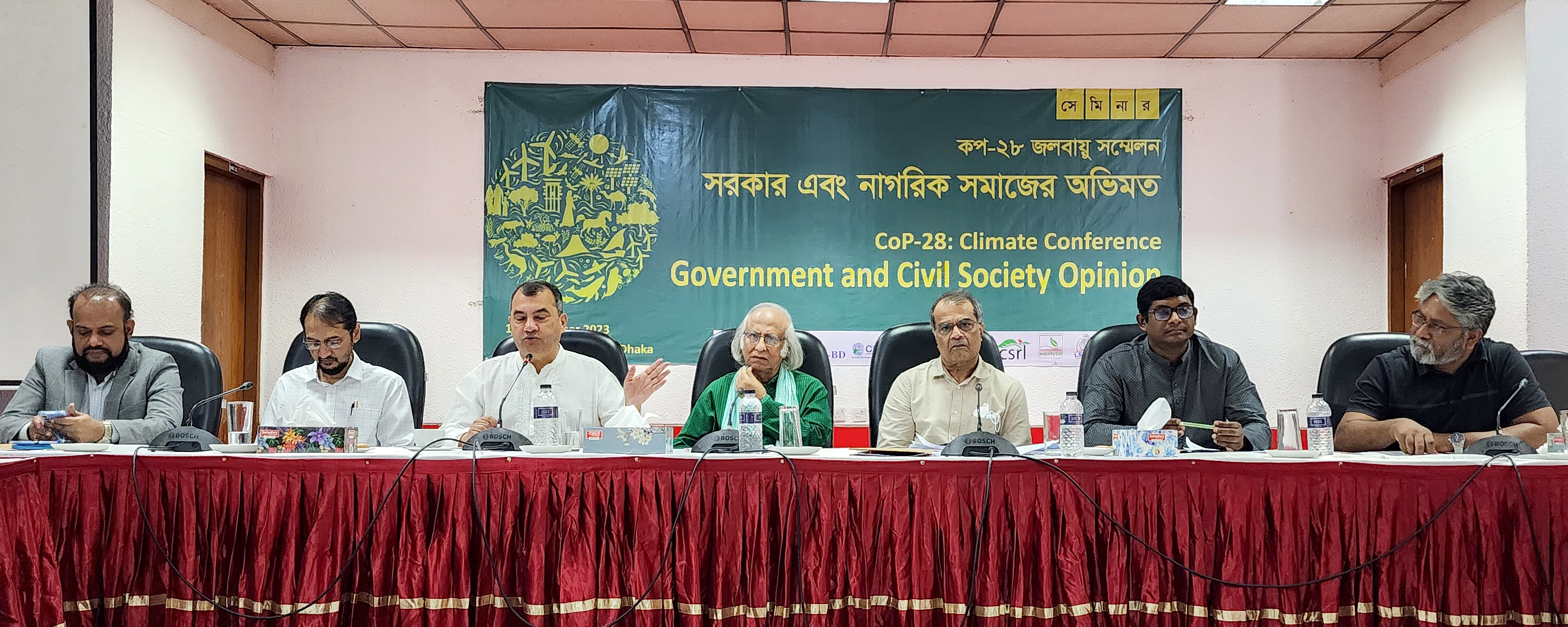Mustafa Kamal Akanda
Published:2023-11-11 18:09:01 BdST
CSOs urge Govt. position to 1.5-Degree goal and stand-alone L&D fund in CoP 28
Civil society organizations (CSOs) demanded a strong govt position for a realistic NDC [National Determined Contribution] from the big emitters achieving 1.5-degree temperature goal in upcoming CoP 28 [Conference of the Parties] global climate conference.
They also advised government to demand for a stand-alone L&D Fund to manage the losses due to climate change impact.
The seminar was organized by COAST foundation, An Organization for Socio-Economic Development [AOSED], Bangladesh Climate Journalist Forum (BCJF), Climate Action Network, South Asia-Bangladesh [CANSA-BD], Centre for Participatory Research & Development [CPRD] Coastal Development Partnership [CDP], Centre for Sustainable Rural Livelihood [CSRL], Equity and Justice Working Group, Bangladesh [EquityBD]), LEDERS, LDC Watch and moderated by Rezaul Karim Chowdhury of EquityBD.
The seminar was chaired by Dr. Qazi Kholiquzzaman Ahmed, Chairman- Dhaka School of Economics and the Chief Guest was Mr. Saber Hossain Chowdhury, Member of Parliament (MP), Special Envoy to the Prime Minister for Climate Change. Barrister Shameem Haider Patwary, MP was participated as special guest.
Among others Mr. Ziaul Haque and Mr. Mirza Shawkat Ali, Directors, Department of Environment [DoE] Mr. Sharif Jamil, Water Keepers-BD, Md. Shamsuddoha of CPRD, Mr. Fazle Rabbi Sadeki Ahmed of PKSF, Ziaul Hoque Mukta of CSRL, M. Ahsanul Wahed of MJF, Mrs. Rabeya Begum, Chair-CANSA-BD, Mrs. Afsari Begum of Concern Worldwide, and many others spoke at the event. Aminul Hoque from EquityBD presented the key notes of the seminar.
Aminul Hoque emphasized the significance of CoP 28, noting its role in the first global stock take on Paris Agreement progress, highlighting failures in achieving targets.
He criticized developed countries for their role in risking the 1.5-degree and finance goals, condemning the USA and allies for not reaching a common position on the L&D Fund.
Hoque provided recommendations for the government negotiation team: 1) Big emitters should revise NDCs for a "Zero Emission" target by 2050, prioritizing 1.5-degree over "Net Zero." 2) Advocate strongly for a stand-alone L&D fund in CoP 28. 3) Design a non-debt instrument for the New Climate finance architecture, prioritizing grants, highly concessional finance, and CBDR&RC for MVCs in the fight against climate change.
Mr. Saber Hossen Chowdhury underscores the deficiencies in the current UNFCCC process, noting its inability to facilitate vital decisions if opposed by a single country.
He urges a concentrated effort to reform the process, pointing out that the prevailing conditions are leading to a deepening crisis and diminishing success. With the upcoming CoP holding significant importance, especially with the Global Stock Take (GST) focusing on the 1.5-degree target, he emphasizes the need for a targeted approach based on updated scientific understanding.
Barrister Shamim Haider paints a stark picture of global climate negotiations, describing it as a sinking ship with limited prospects for substantial outcomes.
The challenge, as he sees it, lies in the ineffective presentation of issues at CoP, necessitating thorough preparation in the form of a vulnerability assessment and a climate finance model that can garner expected acceptance from the global community.
Ziaul Hoque Director-DoE advocates for country-driven climate action over legally binding options, emphasizing the reduction of GHG emissions.
Mr. Fazle Rabbi Sadeki highlights the issue of climate funds for adaptation coming as loans, creating a debt-trap for LDCs.
Mr. Sharif Jamil stresses the need to combat global north emitters while safeguarding national interests.
Ziaul Hoque Mukta and others demand a new climate regime and parliamentary approval for the Paris Agreement.
Unauthorized use or reproduction of The Finance Today content for commercial purposes is strictly prohibited.


